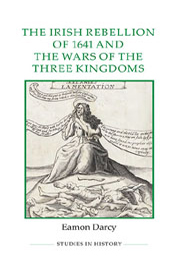Book contents
- Frontmatter
- Contents
- Acknowledgements
- Abbreviations
- Introduction
- 1 Representing violence and empire: Ireland and the wider world
- 2 Imagined violence? The outbreak of the 1641 rebellion in Ireland
- 3 Manufacturing massacre: the 1641 depositions and the Wars of the Three Kingdoms
- 4 The 1641 rebellion and violence in the New and Old Worlds
- 5 Contesting the 1641 rebellion
- Conclusion: The 1641 rebellion in its British, European and Atlantic world context
- Bibliography
- Index
1 - Representing violence and empire: Ireland and the wider world
Published online by Cambridge University Press: 05 May 2013
- Frontmatter
- Contents
- Acknowledgements
- Abbreviations
- Introduction
- 1 Representing violence and empire: Ireland and the wider world
- 2 Imagined violence? The outbreak of the 1641 rebellion in Ireland
- 3 Manufacturing massacre: the 1641 depositions and the Wars of the Three Kingdoms
- 4 The 1641 rebellion and violence in the New and Old Worlds
- 5 Contesting the 1641 rebellion
- Conclusion: The 1641 rebellion in its British, European and Atlantic world context
- Bibliography
- Index
Summary
Barnaby Rich, an Essex-born soldier and amateur poet, wrote extensively of his life on the Munster plantations and of his military encounters with Irish natives. Like many other English settlers, Rich wondered why the conquest of Ireland had failed after four hundred years. He blamed Catholic priests who educated Irish natives ‘in the disciplines of the Popes Church’. Now the indigenous population vowed ‘obedience and subiection to his holinesse’. Consequently, native Irish congregations were trained ‘to hate … and despise their Prince’. Across the Atlantic Ocean a colonial contemporary of Rich based in Virginia, Robert Gray, recorded his views on the newly colonised Native Americans. They were profane heathens – ‘they worship the diuell’, had no manners – ‘differ[ing] very little from beasts’ – and lacked a culture, ‘hauing no art’. There was one glimmer of hope, however, in that the Native Americans were ‘by nature louing and, gentle, and desirous to imbrace a better condition’. The comments of Rich and Gray indicated their sense of superiority over what they termed ‘barbarous’ peoples and reflected intellectual values invested in the term ‘civility’ – a byword for English social, cultural and political supremacy.
Both commentators believed that Irish and American natives under the English crown could be civilised. Rich argued that Irishmen blindly imitated those imbued with a corrosive hatred of English and Protestant rule, while Gray's gut feeling was that ‘it is not the nature of men, but the education of men, which make them barbarous and vnciuill’.
- Type
- Chapter
- Information
- Publisher: Boydell & BrewerPrint publication year: 2013



